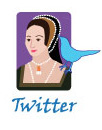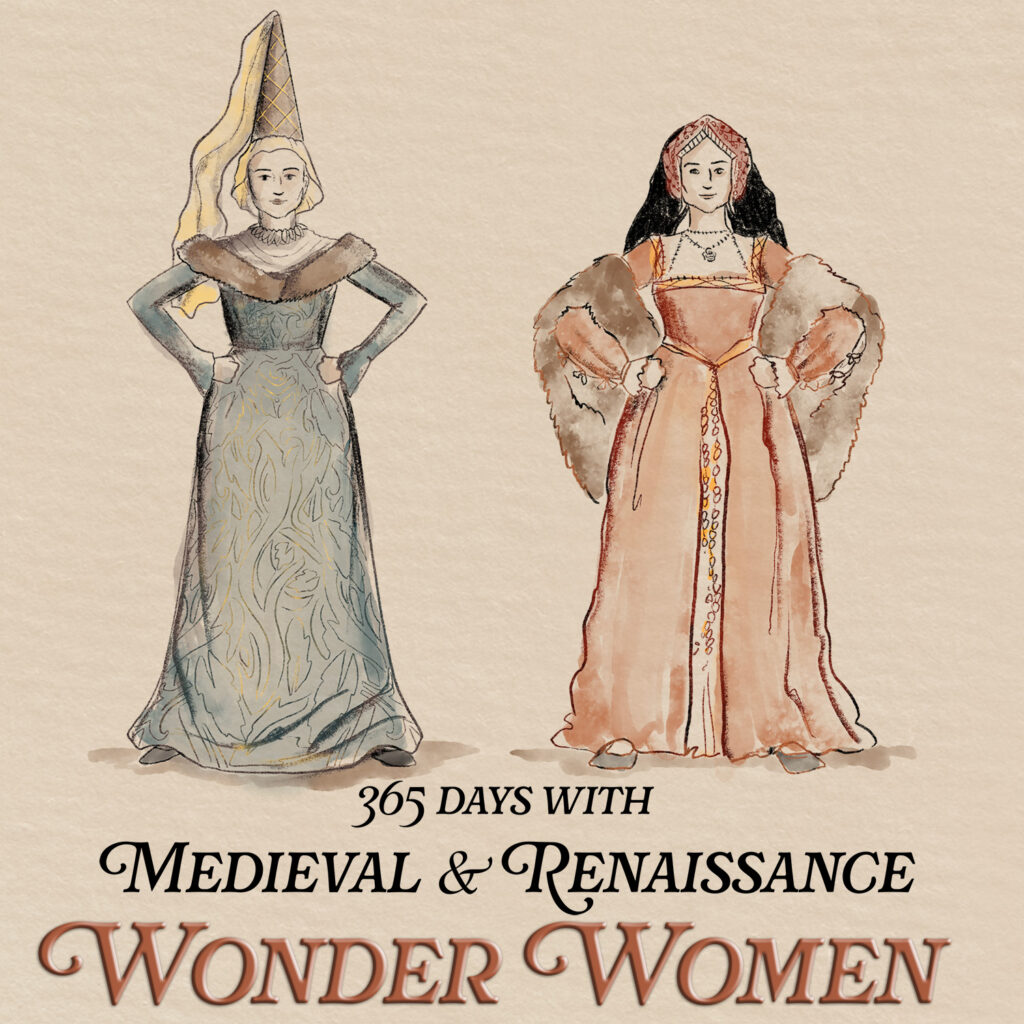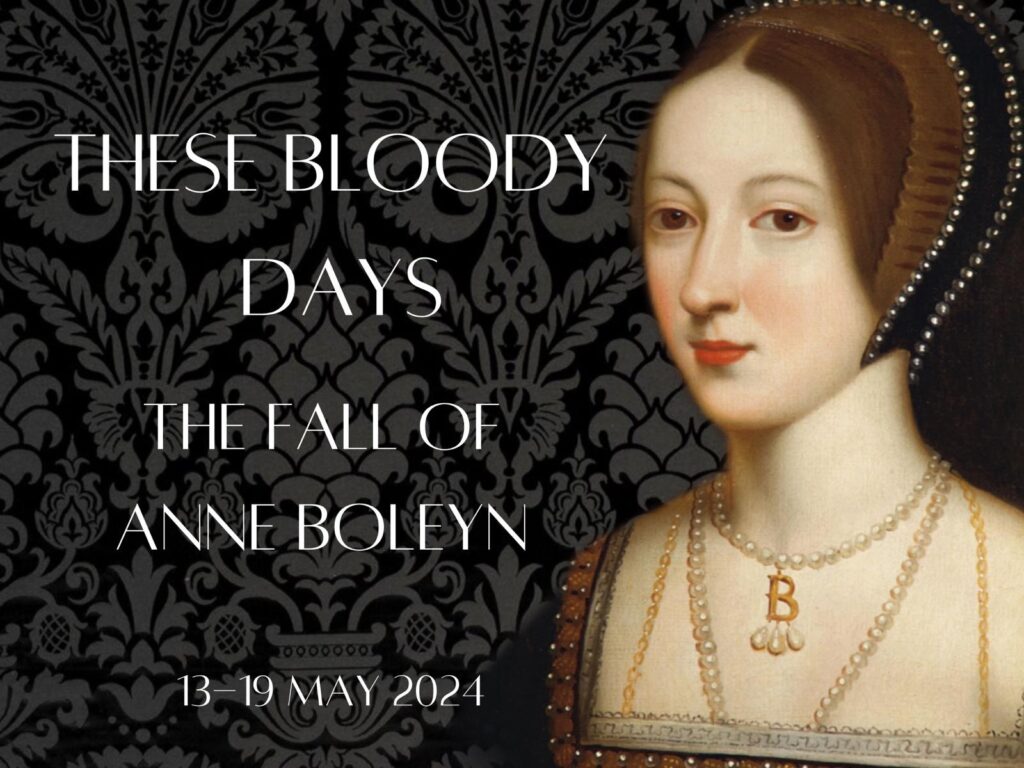ANNE OF CLEVES-MUSICAL INGENUE; TRUMPETING QUEENSHIP
By Brooke C. Little

Anne of Cleves by Hans Holbein the Younger, 16th Century, Le Louvre-Paris
Anne of Cleves, like Katherine of Aragon, was a princess of a foreign royal court. Very little has been written about Anne’s early life and education. Like Jane, Anne was raised in an extremely religious household that later influenced her character and behavior at the English court. She was raised in the Julier-Cleves court in Düsseldorf, the daughter of John III, called the Simple (1490-1539), and Maria (1491-1543), an heiress to the area of Juliers. Evidence of her religious beliefs can be found in her musical involvement as an audience member, a musical ceremonial participant, supporter, and even as a performer.

Portrait of Schwanenburg Castle in the 16th Century- Kleve, Germany, Dutch, 19th Century
The German ambassador, Nicholas Wotton (1497- 1567), detailed some of Anne’s favorable attributes, including mentions of her education and skills. Like a marital resume, Anne’s characteristics were featured in such a fashion as to entice the king into marriage, shedding light on the education of early sixteenth-century women. Duchess Maria, Anne’s mother, oversaw her education by training her primarily in domestic skills such as embroidery and needlepoint. Wotton also mentions that Anne could speak and write in informal German, and thought she might be able to quickly learn English upon arriving at court. In terms of her character traits, Wotton praised her gentle nature, and that unlike her countrymen she was ill-inclined in the drinking of spirits. Very telling of her musical involvement as a child, he noted that Anne could not, “[s]ing or play any instrument, for they take it here in Germany for a rebuke and an occasion of lightness that great ladies should be learned or have any knowledge of music.”[1]
Although there is no record of Anne being musically educated, this does not mean the Julier-Cleves court was completely devoid of musical enjoyment. A record in the Archivalische Forschungen zur Geschichte der Musik an den Hofen der Grafen and Herzoge von Kleve-Jülich confirms that the Juliers-Cleve court supported an eight- to ten-member orchestra with additional singers and that the Duchess herself tended to favor the music of the harp. Within these musical surroundings Anne would have been versed in the importance of her role as an audience member. It was through her attendance at performances that Anne would have acquired the listening and intellectual skills necessary to converse about music, once she learned English, with her famously musical future husband, Henry VIII.

Engraving of a German trumpeter, artist and source unknown. From the web site www.waits.org.uk/.
Negotiations for the marital union between Henry VIII and Anne of Cleves concluded in September 1539. Even from England, Henry sponsored a lavish banquet with court entertainments for the visiting German dignitaries, on September 23, celebrating the conclusion of negotiations. The travelling party expected to be received well by the English people, and documents mention the musical expectations of a triumphal processional entry to English shores. Anne’s brother-in-law loaned her thirteen of his own trumpeting musicians, which were to announce her arrival to each town the party passed along the way. The Court of Cleves, and similar foreign courts, would hire an increased number of musicians to prepare for ceremonial processional like Anne’s, thus adding to their spectacle and prestige. Anne’s reception at Antwerp was particularly popular, according to updates given by Wotton, to Cromwell, who updated the king on Anne’s progress through Europe.
However, later in 1540 Richard Pate informed the king that the pageants that had been rehearsed and prepared for Anne’s arrival had to be canceled because of inclement weather. Thus, Anne’s trumpeting entourage was solely responsible for gaining attention and royal prestige as she travelled to her new home. Anne’s processional escort was comprised of two hundred sixty-three people and two hundred twenty-eight horses, including the German trumpeters, who requested to accompany Anne to England. Even before arriving on English soil for the first time, Wotton approved a request from Southampton to welcome Anne with trumpet music led by English musicians.

Cotton MS. Augustus I. Vol. II. 64. “Map of Anne of Cleves Sea Journey to England” British Library, London.
On January 2, Henry and Anne began their progression together towards London where they would be married. In addition to the fanfare of trumpeters advertising Anne’s arrival and upcoming marriage to the King, several other musical events accompanied her along the way. As Anne and Henry processed near the Thames, she could see and hear the people playing instruments and singing on barges that were decorated with colorful banners. Anne and Henry’s Epiphanal marriage took place January 6, 1540 and was accompanied by music, dancing, song, pageants and banquets.

Old Palace of Greenwich in 1630 by Edward Walford. Old and New London. Vol. VI. London: Cassel, Petter & Galpin, 1899. 174
NOTES
Elizabeth Norton, Anne of Cleves: Henry VIII’s Discarded Bride (Gloucestershire, UK: Amberley Publishing Inc., 2009), 11.
Mary Saaler, Anne of Cleves: Fourth Wife of Henry VIII (London: Rubicon Press, 1995), 11-14.
Retha Warnicke, The Marrying of Anne of Cleves: Royal Protocol in Early Modern England (Cambridge: Cambridge University Press, 2000), 37.
Retha Warnicke, “Henry VIII’s Greeting of Anne of Cleves and Early Modern Court Protocol,” Albion: A Quarterly Journal Concerned with British Studies 28, no. 4 (Winter 1996): 566.






















Loving this series! It is so interesting.
Thank you Alicia Mae! I have loved every second of researching and writing on this topic!
I enjoyed learning more about Anne, I’ve read alot about his first, second,and fifth wife, but hadn’t really encountered something which grabbed my attention towards this “lucky” wife which was one of the women to be able to come away better off, then the three mentioned above.
Thank you
This has given me a little taste, and now I’m looking forward to learning more.
Fascinating! Love this! Not your ordinary wedding?